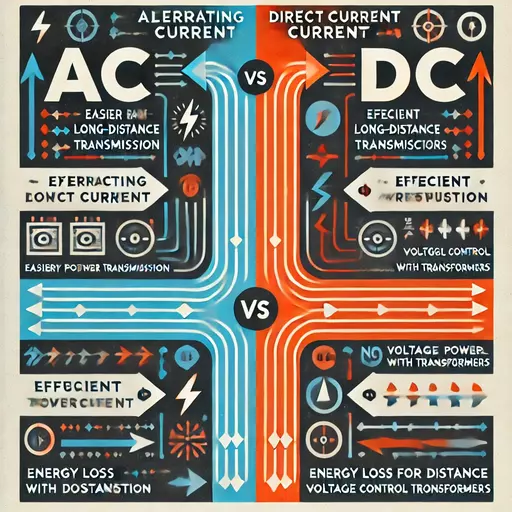This article outlines important reasons why AC are preferred over DC. Here’s a refined version of the points you have already made, improving flow and clarity while maintaining simplicity:

Why AC Is Preferred Over DC ?
Here’s a simplified version of your explanation that could work well for a general audience:
Why AC is Preferred Over DC:
- Less Power Loss: AC loses less power during transmission from the plant to the grid compared to DC.
- Easy Conversion: AC can be easily converted to DC using rectifiers, but converting DC to AC is much harder.
- Flexible Voltage Control: With transformers, AC can be “stepped up” or “stepped down” to different voltages, which isn’t possible with DC.
- Cost-Effective: Generating AC is cheaper than generating DC power.
- AC for Motors: Induction motors, which are common in many appliances, only work on AC power.
AC is Preferred Over DC in a table format:
| Factor | AC (Alternating Current) | DC (Direct Current) |
|---|---|---|
| Power Loss During Transmission | Less power loss over long distances | Higher power loss during transmission |
| Conversion | Easily converted to DC using rectifiers | Hard to convert to AC |
| Voltage Adjustment | Can be stepped up or down using transformers | Cannot be stepped up or down easily |
| Cost of Generation | Cheaper to generate | More expensive to generate |
| Compatibility with Motors | Induction motors work only on AC | Not suitable for most induction motors |
This table breaks down the key differences between AC and DC clearly and concisely.
Why AC System is Preferred over DC System in Ships
In ships, the AC system is generally favoured over the DC system for several key reasons:
- Smaller and Lighter Machines
AC machines are smaller and more compact for a given power output (kilowatts) compared to DC machines. This is crucial for ships where space is limited, and reducing weight is always a priority. - Ease of Manufacturing High Power Generators
High-power and high-voltage AC generators can be manufactured more easily, making them ideal for marine applications that require significant power generation. - Voltage Control Using Transformers
In AC systems, voltage can be easily raised or lowered using transformers. This makes it more efficient for transmission and distribution on the ship, as transformers ensure optimal voltage levels for different operations. - Ease of Maintenance and Voltage Changes
The AC system is easier to maintain and allows for smoother voltage adjustments using AC transformers, making it more practical for long-term shipboard operations. - Simple AC to DC Conversion
AC can be easily converted to DC when needed, making the system flexible to use for specific equipment or applications that may require DC power. - Lower Plant Costs
The plant cost for AC transmission, including components like circuit breakers and transformers, is lower than the equivalent DC transmission setup. This reduces the overall cost of the electrical system on a ship. - Natural Current Interruption
In an AC system, current periodically drops to zero due to the sinusoidal nature of the waveform. This makes it easier to interrupt the current in case of faults, improving safety and fault detection. - Higher Power-to-Weight Ratio
AC systems provide a higher power-to-weight ratio, which is especially important in marine environments where weight must be minimized to improve performance and fuel efficiency. - Alignment with Shore Power Practice
The electrical distribution scheme on ships generally mirrors shore-based practices, which predominantly use AC systems. This alignment makes it easier to connect with shore power when docked, simplifying overall operations.
Demerits of AC System in Ships
While the AC system is preferred for many reasons, it does have some drawbacks:
- Faults Can Lead to Major Hazards
Electrical faults in an AC system can escalate into serious hazards, such as fire or even explosions. This requires strict monitoring and proper safety systems in place to mitigate risks. - Safety Concerns
Safety is of utmost importance when working with AC systems, especially because of the higher voltages involved. Proper protective gear, such as insulated gloves and clothing, must be worn when handling AC circuits to prevent electrical shocks and injuries. - Higher Losses
AC systems tend to have more losses due to resistance in conductors and the generation of reactive power. These losses can reduce overall efficiency and increase energy consumption compared to DC systems.